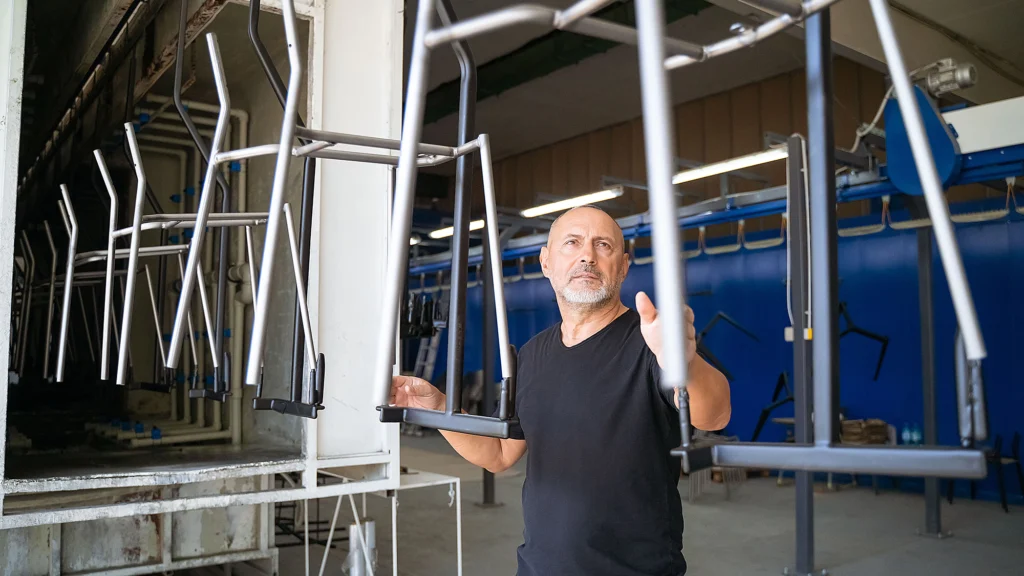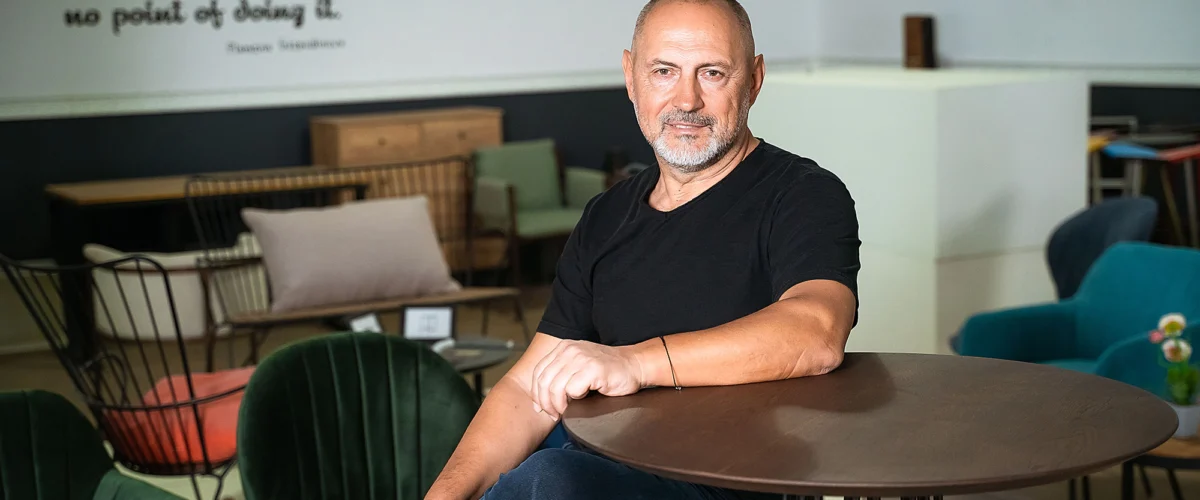The Journey of Galin Gospodinov to His Own Furniture Brand
An Italian connection with a leading chair company paves the way for “Trubna Mebel” into Europe, but when the business environment changes, co-founder Galin Gospodinov creates his own brand
Making a chair, armchair, or any piece of seating furniture is considered one of the most complex processes in the furniture industry due to the intricate shapes, complicated joints, and the mandatory dose of creativity required to find the balance between comfort and design.
“If you can make a chair—ergonomic, strong, beautiful, with a construction that won’t tip over—then you can do anything,” says Galin Gospodinov from personal experience. For nearly 35 years, his factory “Trubna Mebel” in Dobrich has produced 15,000 chairs a month for collections of major European brands. It manufactures tables, consoles, frames, and beds on demand—anything that can be made from metal tubes. For the first time, however, this spring Galin Gospodinov dared to present his own brand of luxury chairs and a table—Voxoli—at Salone del Mobile Milano, the biggest furniture fair in Europe. The Geometry series, made of metal and wood, stood out at the shared booth with several other Bulgarian companies. He watched visitors’ reactions: “People stopped at the booth mainly because of Geometry. That’s where all conversations with potential clients from Europe, Canada, and the Arab states began.”
Interestingly, Geometry was created nearly 10 years ago by designer Velichko Velichkov, during the time when he founded the professional organization “Cherga” with young Bulgarian creatives, gathering them every summer by the sea to develop furniture designs commissioned by manufacturers. Sometimes masterpieces emerged, but often the models were too artistic and remained as sketches, Gospodinov explains.
In 2016, Geometry won the “Bulgarian Furniture of the Year” award and hadn’t been displayed again until its debut at Expo Mebel 2024 in Sofia as part of Voxoli’s collection. The collection includes over 50 chairs and tables ranging from €60 to €260. Geometry is Voxoli’s flagship. Another very attractive series includes a stool and bar chair—Laura, by a Danish designer who generously transferred the rights to the model.
The tricky part in furniture is finding one or two timeless products that can bring steady profits, Gospodinov says: “We’ve been making the same chair model for Calligaris for 18 years, and before us, another company produced it for 15.” Calligaris is a renowned Italian design and furnishing company with five brands and €220 million in revenue for 2022.
With Voxoli, Gospodinov is writing a new chapter in his business story, but he knows it won’t be easy. Furniture labeled Made in Bulgaria struggles to compete with the dominance of Made in Italy, Made in Denmark, or Made in Germany. Moreover, customers constantly compare Bulgarian goods to Chinese ones based solely on price, ignoring the European quality—and this perception is hard to change.
Gospodinov might have remained an OEM manufacturer if the business environment in Bulgaria hadn’t changed. For a long time, “Trubna Mebel” was a competitive metal structure manufacturer in Europe thanks to small batch production, fast delivery, good quality, low taxes, and relatively cheap labor. But times have changed. “Energy costs are now higher here than in other parts of Europe, as is labor, and our competitiveness has dropped. Clients are looking for more favorable production conditions. Since we can’t be sure what new burdens might arise, we decided to develop our own products through Voxoli,” he explains.
GALIN GOSPODINOV IS THE DRIVING FORCE WHO SPARKED HIS FAMILY’S ENTRY INTO METAL FURNITURE MANUFACTURING IN 199
While traveling the world as a ship captain, he came across catalogs of beautiful armchairs and sofas made of metal tubing. They seemed light and comfortable compared to the bulky sofas at home that couldn’t be moved. His father, Pascal Gospodinov, was a metalworking master—which turned out to be the key to their success.
Pascal taught his sons Galin and Diyan how to cut metal and weld tables and chairs in the family garage. The small family company “Gospodinov & Sons” (GS) supplied furniture to local cafes and garage shops that sprang up during the post-socialist transition. The issue was sourcing materials. Metal tubes could only be bought wholesale—in 24-ton truckloads—while they needed only 4 tons. (Today, they process 45 tons of metal per month.) Their solution was to open a small materials exchange and sell off the surplus. No one suspected that this side venture would eventually generate 150 million BGN in annual revenue from construction materials, via the Gospodinovi Stroymarket warehouse chain and G-Stroy DIY stores, now managed by Diyan Gospodinov.
In those early years, the brothers built a solid client base for metal furniture across the country, especially benefiting from the hotel construction boom on the Black Sea coast. They also produced case furniture from particle boards, but their strength lay in chairs.
Each winter, during ski trips to Italy, Galin Gospodinov would pass through the “Chair Triangle”—Udine province, the largest chair production hub. Thousands of manufacturers exported to Europe, the U.S., and Asia. In Manzano, the chair capital, a giant 20-meter chair stands at the entrance to the town. Gospodinov always stopped his car in front of the Calligaris factory, dreaming of someday working with them.
That dream came true in 2007, when a Calligaris representative visited his factory. “They already had a supplier in Bulgaria, but someone local told them about us. The Italian asked for a price. Then he crossed it out and wrote a new, absolutely impossible one.” However, Calligaris was willing to share expertise and even offer part of their quota for metal and paint at significantly lower prices. With their help, the small workshop “Trubna Mebel” turned into a modern plant investing in technology and machines. The Italian partnership served as a reference for other clients in the Udine region. Bontempi Casa came during the financial crisis when Western firms struggled to produce in distant China. Vips & Friends, a Belgian designer brand, followed—known for combining traditional and modern elements. “With them, quality was paramount. They ordered small quantities but wanted fully finished, upholstered products. We found local upholsterers, and now I can say we do upholstery too,” says Gospodinov.
THE MOST CREATIVE PERIOD IN THE BUSINESS
Gospodinov’s link to the Danish interior design company Malmgren Interiors happened by chance. Owner Klaus Malmgren struck up a conversation with a young man delivering pizza to his home, learned he was from Macedonia, and that his brother worked in furniture. The Macedonian factory didn’t meet EU standards, but the brother knew Galin Gospodinov from Dobrich and gave him a recommendation.
In 2008, Malmgren and Gospodinov began an 8-year partnership through GS Malmgren Interiors in Denmark and Bulgaria. Malmgren secured contracts with well-known clients like Gefion Insurance, Tivoli Hotel, Tally Weijl, and Mamalicious, with all production based in Dobrich. The most challenging yet exciting project was for Bang & Olufsen, involving equipment for 1,200 stores worldwide in 20 sqm shop-in-shop formats.
The order was nearly ten times beyond the factory’s capabilities. “But we decided to go for it,” says Gospodinov. The start was a disaster. The designer visited the factory, inspected finished products for 100 stores, and said, “This plywood has too coarse a grain.” He demanded everything be redone, paying only for materials—not labor. “We had to choose: cancel the contract or swallow the losses and move forward,” Gospodinov shares. He realized that big brands are valuable portfolio assets and completed the order. Profits were modest, but the company gained experience in managing large projects—with all the ups and downs: “We had problems hiring new people, and they made mistakes. Everyone worked 10–12 hours, including Saturdays and sometimes Sundays. We pushed hard. But when the project ended, we had to let people go.” This cycle repeated with every big project—and so did the challenges.

Galin Gospodinov believes that his company “Trubna Mebel” still has a future as a contractor because tubular furniture manufacturers are few in Europe. | Photo: Erdjan Bekir
In 2009, GS Malmgren Interiors opened another office in Germany and began presenting itself as an international company with production in Bulgaria. The local partner, Stefan Knoblauch, who had previously managed several projects, closed one or two deals—and that was it. His job was to find clients, but “he didn’t fight for them.” If he didn’t get a response to an email, he wouldn’t follow up because “it was impolite.”
In an effort to save the company, Gospodinov tried to explain his own approach to sales: “If they close the door on you, you enter through the window. If they throw you out the window, you wait in the parking lot to show how badly you want to work.” But that didn’t work either. The German office quickly shut down—at a loss.
In 2016, he also parted ways—painfully—with Klaus Malmgren, who ran into financial difficulties and closed his company in Denmark. “I really wanted that company to become big. It was doing very well until Klaus and I parted ways. After that, I let it drift,” admits Gospodinov.
He got back into active business three years ago, and “things started to fall into place.” “Trubna Mebel” reached 5 million BGN in revenue for 2024, similar to the good times.
THIS TIME, GOSPODINOV HAS A GOAL: HIS BUSINESS SHOULD NOT DEPEND ON JUST ONE BIG CLIENT –
Calligaris: “Sometimes, even when we’re on great terms, when it comes to money and deals, things can get very rough.” Metal is a commodity, and when prices rise, critical situations emerge. A tough dispute over a €0.50 price increase per item nearly ended the collaboration with Calligaris. “We argued all morning. At lunch, we stopped to have a bite and a glass of wine, and then resumed the argument. When I said I would shut down operations, we settled on a €0.40 increase,” says Gospodinov. “If he hadn’t agreed, I would’ve had to close the factory or operate at a loss for a few months and close it anyway. That’s why sometimes it’s better to take risks.”
His new plan involves Houe, an up-and-coming Danish design house with indoor and outdoor furniture collections. Some time ago, Klaus Malmgren brought Houe’s owners to Dobrich. To show off the factory’s capabilities, Gospodinov showed them a special wall filled with client signatures under the motto that every business is built on trust and partnership. They added their own signature, saying they would find a way to work together someday.
That time came after the COVID pandemic, which led to a boom in outdoor furniture. Houe was working with a Chinese supplier but was seeking a second one in Europe. They spent two years testing models in Dobrich before placing the first orders this year. “The idea is to produce all models for the U.S. market here because of tariffs on Chinese goods,” says Gospodinov.
He believes “Trubna Mebel” still has a future as a contractor, because there are very few tubular furniture manufacturers left in Europe: “In Bulgaria, it’s just me. Unfortunately, the others are gone.” However, his main focus is on developing his own brand Voxoli, especially now that he has the support of the next generation in his family.

